BBC Broadcasting House
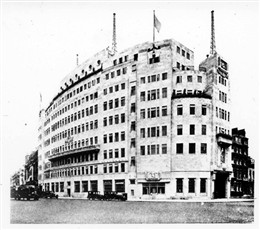
BBC Broadcasting House, Portland Place
Copyright Westminster City Archives
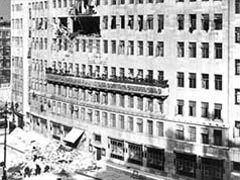
Damage to BBC Broadcasting House, October 1940
Copyright BBC
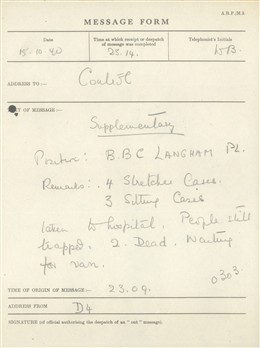
St Marylebone ARP Message Form , BBC Broadcasting House, 15 October 1940
Copyright Westminster City Archives
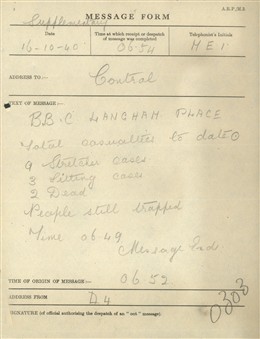
St Marylebone ARP Message Form, BBC Broadcasting House, 16 October 1940
Copyright Westminster City Archives
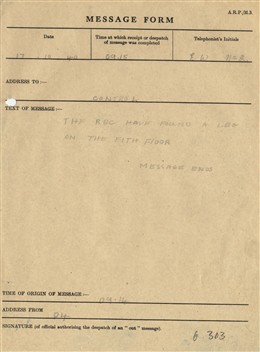
St Marylebone ARP Message, BBC Broadcasting House, 17 October 1940
Copyright Westminster City Archives
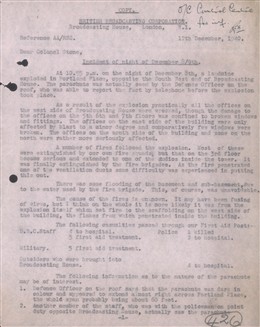
St Marylebone ARP Incident Report, BBC Broadcasting House, 12 December 1940
Copyright Westminster City Archives
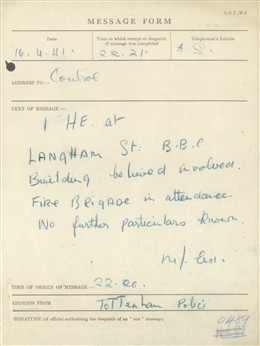
St Marylebone ARP Message Form , BBC Broadcasting House, April 1941
Copyright Westminster City Archives
BBC Broadcasting House, Portland Place, W1
15 October 1940
By Ronan Thomas
BBC Broadcasting House on Portland Place W1 was seriously damaged twice during air raids in 1940.
Just after 8pm, on 15 October 1940, the British Broadcasting Corporation’s headquarters (built 1932) were hit by a 500lb delayed-action high explosive bomb.The bomb destroyed the BBC switchboard before penetrating the Music Library on the fifth floor.
Staff tried to move it by hand, but it exploded during the attempt. Seven BBC members of staff were killed.
Parts of the fifth and sixth floor Art Deco frontage of Broadcasting House were blown into Portland Place: several studios disintegrated; glass and debris littered the roadway on Portland Place as far as the junction with Duchess Street.
A small fire also broke out but was brought under control by the BBC’s own fire teams by 9.18pm. Broadcasting House's aerial mast, clock tower and south front entrance hall were not damaged.
BBC eyewitnesses recorded that the nightly wireless news was still being read – by radio newscaster Bruce Belfrage – as the blast shook the building. Covered by dust in his basement studio, Belfrage paused slightly, then finished the nine o’clock news bulletin. Listeners heard the (muted) bomb blast live over the airwaves.
Messages telephoned to the St Marylebone Report Centre (at Marylebone Town Hall) from the local ARP Post (D4) show that emergency rescue vehicles and a mortuary van were requested at 10.35pm.
ARP reports for 11.34pm initially suggested that injured BBC staff members were still trapped on the third floor but by 12.28am eleven casualties had been removed from Broadcasting House. A grim ARP message form received by the St Marylebone Report Centre at 9.15am the next morning underlined the bomb's horrific effect.
The clear up continued throughout the rest of October 1940. Broadcasting House's original white Portland Stone facade was painted dark green.
At 10pm, 8 December 1940, BBC Broadcasting House was hit again. According to a St Marylebone ARP report written on 12 December 1940, a parachute mine struck Portland Place, yards from Broadcasting House and the Langham Hotel.
The parachute mine – an eight foot high black cylinder attached to a dark-coloured parachute canopy - was actually witnessed by a BBC Defence Officer on the roof of Broadcasting House. This observer had time to make a telephone warning, watching as it drifted slowly down.
The mine’s parachute caught on a lamp post close to the Langham Hotel before detonating to devastating effect. It carved out a deep crater in Portland Place which rapidly flooded after the local water mains and sewer were ripped open.
One police constable stationed outside was killed outright, a second was injured. Broadcasting House and the Langham Hotel were hit by blast and shrapnel. Fires took hold in Broadcasting House, in Portland and Langham Places for seven hours. The roof and spire of neighbouring All Souls Church, Langham Place were badly damaged.
Several other houses on the western side of Portland Place – particularly 3 Portland Place - also suffered blast damage, hospitalising four residents.
At Broadcasting House, the mine blast blew out many street-facing windows, tore though several offices and wrecked a car parked outside. Passing pedestrians and staff working inside were bowled over by the explosion. Small fires were again tackled by BBC fire squads.
A more serious blaze on the third floor threatened the main tower and ventilation shafts until extinguished by the Auxiliary Fire Service (AFS). The basement studios and sub-basements suffered serious flood damage from fire hoses.
Between 10.58pm and 12.36am, 9 December, St Marylebone ARP Posts D1, D2, D3 and D4 - handling the BBC and Langham Hotel incidents in tandem - requested the dispatch of stretcher parties, light rescue teams, mobile first aid units, mortuary vans and repair parties to the scene.
The streets around Portland and Langham Places were roped off and the ARP and emergency teams set up dozens of trestle tables demarcating the piles of debris and the flooded bomb crater. Just before midnight, an urgent call also went out from the local ARP Posts for more ladders.
By 12.11am, 9 December, all casualties had been extracted from Broadcasting House; the fires in the building were under control by 12.28am. At 1.26am, ARP messages warned that gas was escaping from broken coal gas mains near to the Langham Hotel. By 1.57am the ARP had assessed the number of casualties in and around Broadcasting House at twenty; the dead policeman was taken to Paddington Mortuary, fifteen others were taken to Middlesex Hospital with the rest described as ‘sitting cases’. This figure was revised upwards at 9.19am to two dead and thirty stretcher cases. On 12 December, St Marylebone ARP arrived at a final casualty total: one policeman dead, two others hospitalised; four BBC staff hospitalised, five given first aid; five military staff and four other civilians hospitalised.
In the hours following the bombing, the ARP worked rapidly - by 6am Portland Place was reopened to pedestrians. The BBC’s European Service began its broadcasts for 9 December 1940 from emergency studios in Maida Vale.
After the December incident the main entrance to Broadcasting House (protected by sandbags and guarded inside by sentries and police since September 1939) was reinforced further with a pillbox and concrete and brick apron wall.
Months later, BBC premises in the area still remained vulnerable. At around 10pm on 16 April 1941 a high explosive bomb just missed Broadcasting House, destroying parts of Chapel Mews, next to Langham Street. One BBC worker died in local offices. St Marylebone ARP messages record the dispatch of two ambulances and a stretcher party at 11.59pm to the front entrance of Broadcasting House. Just after 2am on 17 April another bomb hit streets in the immediate vicinity. BBC operations were not affected.
During the heavy raid of 10-11 May 1941, bombs again fell in the streets close to Broadcasting House. One BBC member of staff was reported killed. Fire also destroyed the adjacent Queen’s Hall in Langham Place, home since 1927 to the BBC Proms.
Broadcasting House was spared further bomb damage, although in late 1940 some of its broadcast facilities and many staff members were forced to transfer to temporary studios at nearby 200 Oxford Street (among them broadcaster and writer George Orwell who worked from 1941-1943 for the Indian Section, BBC Eastern Service).
The BBC Overseas Services also moved out of Broadcasting House to new premises on Oxford Street (today’s Orwell Studios at 24 Market Place). From 1942, BBC Radio continued to broadcast from the roof of this building, including during air raids. In turn, the BBC External Services redeployed to Bush House, Aldwych, itself later damaged in a V1 attack on 30 June 1944.